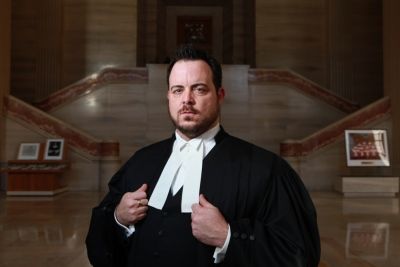
On April 15, after hearing submissions in R v Lloyd, the Supreme Court of Canada (SCC) struck down as unconstitutional the latest in a series of mandatory minimum sentences. Queen’s Law alumnus Eric Gottardi, Law’02, played an instrumental role, serving as pro bono counsel for the Canadian Bar Association (CBA), an intervenor in the case.
Gottardi assisted accused Joseph Lloyd’s case that his one-year mandatory drug sentence violated the fundamental tenets of Canada’s Charter. Gottardi, with co-counsel Mila Shah, argued that mandatory minimum sentences need exemption clauses, and that they must be sufficient where they already exist.
As was the issue with other mandatory minimums, they do not allow trial judges to take into account the circumstances of an accused. The law “would require the same mandatory minimum sentence for a broad range of conduct and different circumstances of individual offenders,” explains the CBA. In this case, the SCC ruled that the sentence violated Section 12 of the Charter (which covers the right to be free from “cruel and unusual punishment”).
“With the Harper government, Canada went from 25 mandatory minimums to over 60,” explains Gottardi. “In two cases, Nur and Lloyd, the court reaffirmed that the accused and their advocates can test the constitutionality of minimums using reasonable hypotheticals. In Lloyd, they said that these sentences would be constitutionally vulnerable unless they are extremely tailored, or if Parliament drafts a general exemption clause into the Criminal Code. The focus of the CBA has been to advocate for the creation of this exemption clause. Canada is the only jurisdiction in the world that doesn't have an exemption clause of mandatory minimums.”
Gottardi is no stranger to the Supreme Court, having previously argued in R v Nur (mandatory minimums related to guns), as well as R v Pires (wiretap authorizations), United States of America v Ortega (sufficiency for committal standard in extradition proceedings), R v H.S.B. (sufficiency of judicial reasons), R v Sekhon (expert police witnesses) and R v Jordan(unreasonable delay under Section 11(b) of the Charter). In fact, being able to argue constitutional challenges is part of what inspired Gottardi to work in criminal law. “It’s a great area for those interested in constitutional law,” he says. “If there is something that you don’t like about the law, criminal law gives you a really direct way to challenge the government in their decisions. It’s dialogue with Parliament without being a politician.
It was also his time as a Queen’s Law student that drove him towards his field of practice. “Queen’s was, and still is, a leading criminal law school in Canada,” Gottardi says. “With professors like Don Stuart, a legend in the profession (who has been cited frequently by the SCC), I studied under some of the very best criminal scholars in the world. I couldn’t have asked for a better preparation for my career. One of his favourite memories of law school is interacting with those faculty members in “social settings, as equals” and discussing intellectual and academic ideas with them. Queen’s was unlike any university experience he had ever had, because of the “close family atmosphere,” he adds. “Professors got to know us, and cared about how we did in school and in our careers afterwards.
Gottardi is a partner at the Vancouver-based Peck and Company. The one thing he misses most about his time at Queen’s is the “privileged access” that law students in Kingston have to legal scholars, members of the judiciary and practising lawyers. “The level of interaction between the student body and the professors, local judges and other invited guests,” he says, “was something really special.”